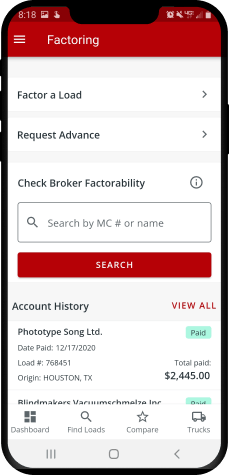What is Factoring?

Get paid faster with Factoring.
Say goodbye to cash flow worries.
In the trucking world, factoring (also known as “accounts receivables financing”) is when a carrier partners with a third-party financial company to sell an invoice they have so they can get paid faster on an invoice. It’s then up to the third-party financial company – the “factor” – to get paid on the invoice.
It’s not a loan, and any associated fees are deducted from the amount due on the invoice as it is paid out to the carrier.
Factoring is a great option for carriers who are looking for better cash flow. It allows them to get paid a lot faster than the 30-60 days it typically takes for an accounts receivable department to process an invoice. Getting paid faster makes it easier for an owner-operator to manage their business considering how quickly loads can be turned around. It means a carrier isn’t waiting for a check to arrive in the mail.
How it works if you’re a carrier using a factoring company:
- You haul a load.
- You submit your paperwork to a factoring company instead of the broker you moved the load for.
- The company pays you right away minus whatever their fee is, and they work with the broker to collect on the invoice.
- The broker pays the factoring company.

What are some of the benefits of factoring for carriers?
- Cash flow. Carriers will have more cash on hand to cover expenses – whether they’re business or personal expenses.
- Credit scores aren’t important. Factoring companies will be interested in a broker’s or their company’s credit score, but carrier credit score isn’t important.
- More time for what matters. Carriers aren’t worried about who has paid them versus who hasn’t. Since there’s less bookkeeping to do, carriers have more time to put back into their business or to spend with their family.
- No extra debt. Because it isn’t a loan, carriers aren’t accruing additional debt when they opt in to using it.
What is the difference between recourse and non-recourse factoring?
Recourse factoring means that the carrier will take responsibility of an invoice if the factoring company is unable to collect from the broker. Non-recourse factoring protects a carrier in the event a broker doesn’t pay the invoice as long as the carrier isn’t at fault for non-payment (the incorrect paperwork was submitted, for example).

Is factoring the same as quick pay programs that are available?

Factoring and quick pay programs are very similar as they both offer the benefit of getting paid faster than the typical accounts receivable process. Factoring and quick pay programs will differ significantly between the companies that offer them.
With a factoring company, you typically pay a flat rate for every load. Whereas with quick pay, you may end up paying a different rate depending on the broker. It should also be noted that not all brokers offer a quick pay program. Because of this, factoring can offer a reliable and consistent means of quick cash flow.
Depending on how you’re running your business will determine if factoring or quick pay works better for you. Not only that, but you may find that there are times when one works better for your business than another.
Support
If you’re interested in learning more about factoring, you can talk to one of our experts at 1-888-777-5543, or email us at [email protected].
Get helpful content delivered to your inbox.
Sign up today.
Find high-quality loads fast, get higher rates on every haul, and access tools that make your job easier at every turn.






